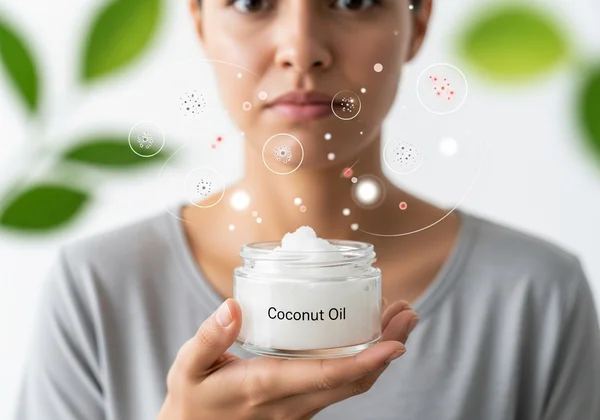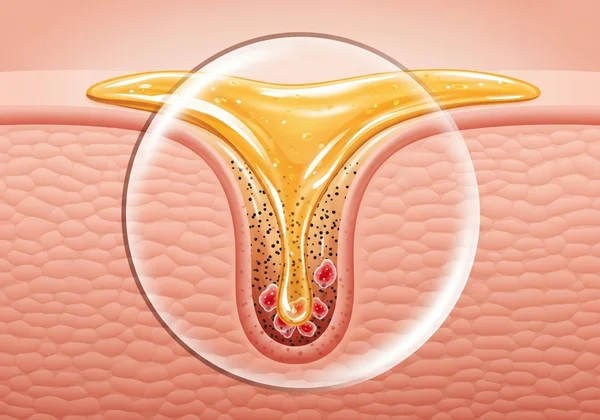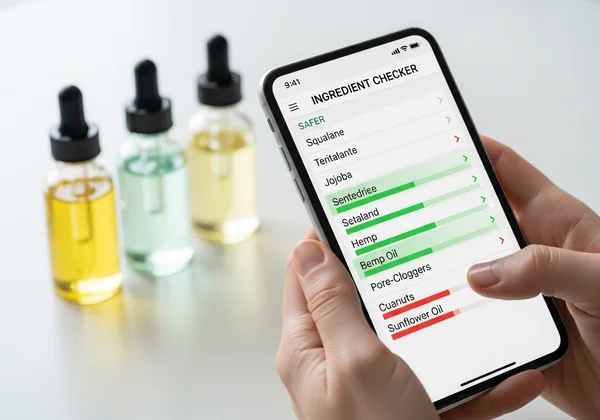Is Coconut Oil Comedogenic? | Clogging Pores & Acne
Confused about coconut oil and acne? You're not alone. This popular ingredient is often praised as a natural wonder, but its role in skincare is one of the most debated topics, especially for those with acne-prone skin. Is coconut oil comedogenic? For many, the answer is a frustrating "it depends." This guide cuts through the noise to provide a science-backed verdict on whether this popular oil contributes to clogged pores and breakouts.

Could this natural remedy be the hidden culprit behind your breakouts? This article will empower you to make an informed decision for clearer, healthier skin. The first step to taking control is knowing what’s in your products, which you can easily do with a Pore Clogging Checker.
Understanding Comedogenicity: The Scale of Pore Clogging Potential
To understand the coconut oil debate, we first need to grasp comedogenicity. It’s a term on many skincare labels, but its true meaning is often misunderstood. Knowing what it means is key to decoding ingredient lists and protecting your pores.
What Does "Comedogenic" Really Mean?
A "comedogenic" ingredient is one that tends to clog pores. When pores get clogged with dead skin cells, oil (sebum), and debris, it creates the perfect environment for pimples, blackheads, and whiteheads (comedones) to form. An ingredient's potential to do this is measured using the comedogenic scale.
The Science Behind the Comedogenic Scale (and Its Limitations)
The comedogenic scale is a rating system that ranks ingredients from 0 to 5 based on their likelihood of clogging pores.
- 0: Will not clog pores.
- 1: Very low likelihood of clogging pores.
- 2: Moderately low likelihood.
- 3: Moderate likelihood.
- 4: Fairly high likelihood.
- 5: High likelihood of clogging pores.
Coconut oil typically receives a rating of 4, placing it on the higher end of the scale. However, understanding the system's limitations is crucial. Ratings were often determined by tests on more sensitive rabbit ears. Furthermore, an ingredient's concentration and individual skin chemistry can dramatically alter outcomes; a product isn't necessarily 'bad' just because it contains one moderately comedogenic ingredient.

Why Coconut Oil Can Clog Pores for Some (The "Does Coconut Oil Clog Pores" Dilemma)
Does coconut oil clog pores for everyone? Not necessarily, but for those with oily or acne-prone skin, the risk is significant. The reason lies in its unique chemical makeup and interaction with the skin.
Fatty Acid Profile: Lauric Acid and Myristic Acid
Coconut oil is rich in fatty acids, particularly lauric acid (about 50%) and myristic acid. While lauric acid has antimicrobial properties that can fight acne-causing bacteria, it's also a thick, heavy molecule. This richness makes coconut oil highly occlusive, meaning it forms a protective barrier on the skin.
For dry skin, this barrier can be a blessing, locking in moisture. For acne-prone skin, it can be a curse. The thick film can trap dead skin cells, sebum, and bacteria inside pores, leading directly to inflammation and breakouts. This composition makes it a prime suspect in your skincare routine.

Individual Skin Response & the Role of Skin Microbiome
Skincare is never one-size-fits-all. A person with very dry, resilient skin might use coconut oil without any issues because their skin doesn't produce enough oil to get trapped. In contrast, someone with oily or combination skin already has excess sebum, and adding a heavy oil like coconut oil can quickly lead to congestion.
Your skin microbiome—the unique community of bacteria living on your skin's surface—also plays a role. The balance of this microbiome can influence how your skin reacts to different ingredients. This is why your best friend might swear by a product that causes you to break out. The only way to know for sure is to identify and test ingredients. An acne ingredient checker is the perfect starting point.
Different Forms of Coconut Oil and Their Impact on Acne-Prone Skin
Not all coconut oil is created equal. The form of the ingredient matters, though for those with acne-prone skin, caution is advised across the board. Understanding these differences helps you become a more discerning consumer.
Virgin Coconut Oil vs. Refined Coconut Oil
Virgin coconut oil is extracted from fresh coconut meat and is unrefined, retaining more of its natural compounds. Refined coconut oil is processed from dried coconut meat (copra) and undergoes bleaching and deodorizing. From a comedogenic standpoint, both are generally considered risky for facial use on acne-prone skin due to their high concentration of pore-clogging fatty acids.
Fractionated Coconut Oil (MCT Oil): A Safer Alternative?
Fractionated coconut oil, also known as MCT oil, is a modified version where the long-chain fatty acids, primarily lauric acid, have been removed. This leaves the medium-chain triglycerides (MCTs), resulting in a lighter, non-greasy liquid that stays fluid at room temperature.
Because the most occlusive component is gone, fractionated coconut oil has a much lower comedogenic rating (around 1-2). This makes it a potentially safer option. However, if your skin is extremely sensitive or reactive, even this lighter version could pose a risk.
The Verdict: Is Coconut Oil Good for Acne-Prone Skin?
After reviewing the science, the verdict is clear: for individuals with acne-prone, oily, or combination skin, applying pure coconut oil to the face is not recommended. While it has beneficial properties, its high comedogenic rating and occlusive nature present a significant risk of clogged pores and new breakouts.
Your skin deserves ingredients that support it, not work against it. The best way to ensure your products are safe is to check your products for this and other known irritants.
When to Avoid Coconut Oil on Your Face
You should be especially cautious with coconut oil if:
- You have an oily or combination skin type.
- You are currently dealing with active acne, blackheads, or whiteheads.
- You have a history of easily congested pores.
- The product in question is a leave-on formula like a moisturizer, serum, or face oil.
Safer Alternatives for Hydration and Barrier Support
Thankfully, there are many excellent, safer alternatives for moisturizing acne-prone skin. These oils provide hydration and support the skin barrier without the high risk of clogging pores. Look for ingredients like:
- Squalane Oil: Lightweight and mimics the skin's natural sebum.
- Jojoba Oil: Structurally similar to our own oil, helping to balance production.
- Hemp Seed Oil: Rich in linoleic acid, which can help regulate sebum.
- Sunflower Seed Oil: High in linoleic acid and non-comedogenic.
Your Next Steps to Clearer Skin: Be an Ingredient Detective!
Navigating skincare can feel overwhelming, but knowledge is power. Understanding why an ingredient like coconut oil might be problematic for your skin is the first step toward a truly effective routine. Don't let confusing labels and marketing hype dictate your skin's health.
It’s time to become an ingredient detective. Don't guess what's in your products. Take control of your skincare journey by using our free skincare ingredient checker to instantly analyze any ingredient list. Unveil the hidden culprits in your routine and pave the way to clearer, healthier skin.

Frequently Asked Questions About Coconut Oil & Acne
Is coconut oil the only ingredient I need to worry about for clogged pores?
Absolutely not. Coconut oil is a well-known offender, but many other ingredients can also cause congestion. Common culprits include isopropyl myristate, certain algae extracts, lanolin, and even some "natural" butters like cocoa butter. A comprehensive check is always the best approach.
What are some common alternatives to coconut oil for moisturizing acne-prone skin?
Excellent non-comedogenic or low-comedogenic moisturizers include squalane, jojoba oil, sunflower oil, grapeseed oil, and hemp seed oil. For hydrating ingredients in creams and lotions, look for hyaluronic acid and glycerin.
How can I easily check if my products contain coconut oil or other pore-clogging ingredients?
The easiest and most reliable method is to use a dedicated online tool. You can simply copy the full ingredient list from a product's website or packaging and paste it into our free online tool. It will instantly scan the list against a scientific database and highlight any potential pore-cloggers for you.
Does a "non-comedogenic" label mean a product is safe from coconut oil and other clogging ingredients?
Unfortunately, no. The term "non-comedogenic" is not regulated by the FDA. This means companies can use it as a marketing claim without rigorous testing or proof. A product labeled "non-comedogenic" can still contain ingredients that cause breakouts for some people. Always analyze ingredients now to be certain.